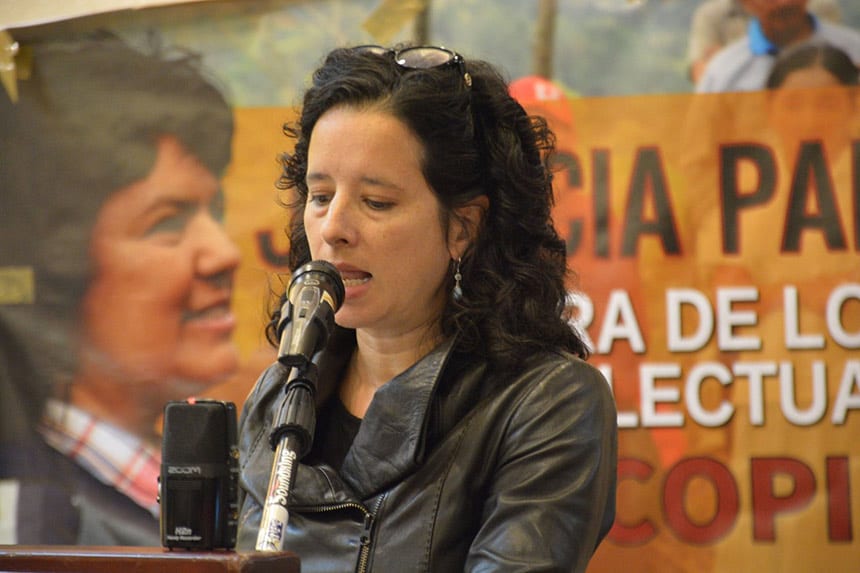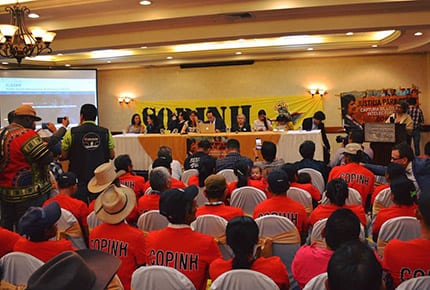
By Erin Gordon
The brutal slaying of Honduran environmental activist Berta Cáceres was orchestrated by powerful corporate forces with involvement from state actors, according to a new investigative report released this week. The report was a joint collaboration among an independent team of international lawyers that included Roxanna Altholz, associate director of the International Human Rights Law Clinic, and her students.
A 2015 winner of the Goldman Environmental Prize, Cáceres, 44, was killed in La Esperanza, her small Honduran hometown, in March 2016. Cáceres and the organization she founded, the Council of Popular and Indigenous Organizations of Honduras (COPINH), had long opposed the Agua Zarca hydroelectric dam being built on the Gualcarque River, which is on indigenous Lenca land. In particular, COPINH had filed lawsuits, organized community opposition and filed a claim with the Inter-American Commission on Human Rights.
Cáceres had received many death threats for her work in Honduras, the world’s most dangerous country for activists defending land and the rights of indigenous people, according to Global Witness.
Dissatisfied with the government’s investigation into the murder, which remains open, Cáceres’s family turned to a group of legal experts. The international legal team was selected upon the recommendation of several human rights organizations working with the family. Known as the International Expert Advisory Panel, the lawyers spent the past year independently investigating Cáceres’s murder, the involvement of corporations and institutions that financed the hydroelectric project, and the state’s response.

The panel’s report determined that the masterminds behind Cáceres’s murder included executives at the Honduran company Desarrollos Enérgeticos S.A., also known as Desa, which obtained a concession to build the dam in 2009. Agua Zarca Hydroelectric is Desa’s dam division.
“Our report reveals new information about the criminal structure supporting the murder,” said Altholz, one of the report’s principle authors. “Evidence implicates company officials and reveals crimes by state actors, including corruption and abuse of authority. A whole criminal enterprise existed to neutralize and eliminate opposition to the project.”
All told, Altholz spent two months in Honduras during the last year. She reviewed 10 judicial proceedings and 55 gigabytes of digital data, including cell phone records. The final report consists of approximately 30 pages of evidence analysis plus 30 pages of fully sourced appendix.
“The evidence reveals the culpability of company executives and state agents,” Altholz said. “The report also concludes that the criminal investigation conducted by Honduras with the support of the U.S. government was flawed and incomplete and that the policies of international financial institutions are insufficient to protect the critics” of internationally-financed development projects.
Several Berkeley Law students helped on the investigation, and the legal team was “profoundly impressed by the students’ research skills and professionalism,” Altholz said.
Astrid Ackerman ‘18 researched Desa and companies who funded the dam. “I was already interested in human rights work, but this project reaffirmed it,” Ackerman said. “It gave me an understanding of the ways you can do human rights research beyond just legal provisions. We used different tools, including Wikileaks and the Panama Papers. Working on this report also enhanced my critical thinking skills, as I learned the different dynamics that lead to human rights violations.”
For David Gomez ’18, the project helped hone his investigation and “team-based collaboration skills,” he said. Altholz also taught the students “what quality work is actually supposed to look like,” added Gomez. “It broadened my view of the law and of justice by showing me that there is great work that can be done abroad, internationally or transnationally.”

Natalia Ramirez Lee ’18 conducted factual research on Cáceres’s case. She reviewed academic articles and reports by international organizations like the United Nations and the Inter-American Commission, and spoke with journalists who’d reported Cáceres’s murder.
Lee said the work taught her about “the role of lawyers in upholding the rule of law.” It was also an “amazing opportunity to work collaboratively.” Legal education, she added, “is often an individual endeavor. But after graduation, there are few times that you’re not working with other people on a case. This was good preparation for that.”
The Cáceres project also taught Lee to “trust the process” and be flexible. “Law school often has very particular, specific tasks. But this was an amorphous project. I learned to change approaches as a project develops.”
In addition to Berkeley Law’s Altholz, the lawyers who authored the report are: Daniel R. Saxon from Leiden University; Miguel Angel Urbina Martinez, a Latin American criminal law expert; and Colombian human rights lawyers Jorge E. Molano Rodriguez and Liliana Maria Uribe Tirado.
Based on its findings, the International Panel recommends that Honduras revoke the concession, licenses, and permits for the Agua Zarca Dam, among other actions. It also calls for the Public Ministry in Honduras to conduct an exhaustive investigation that leads to the dismantling of the criminal network responsible for Cáceres’s murder.